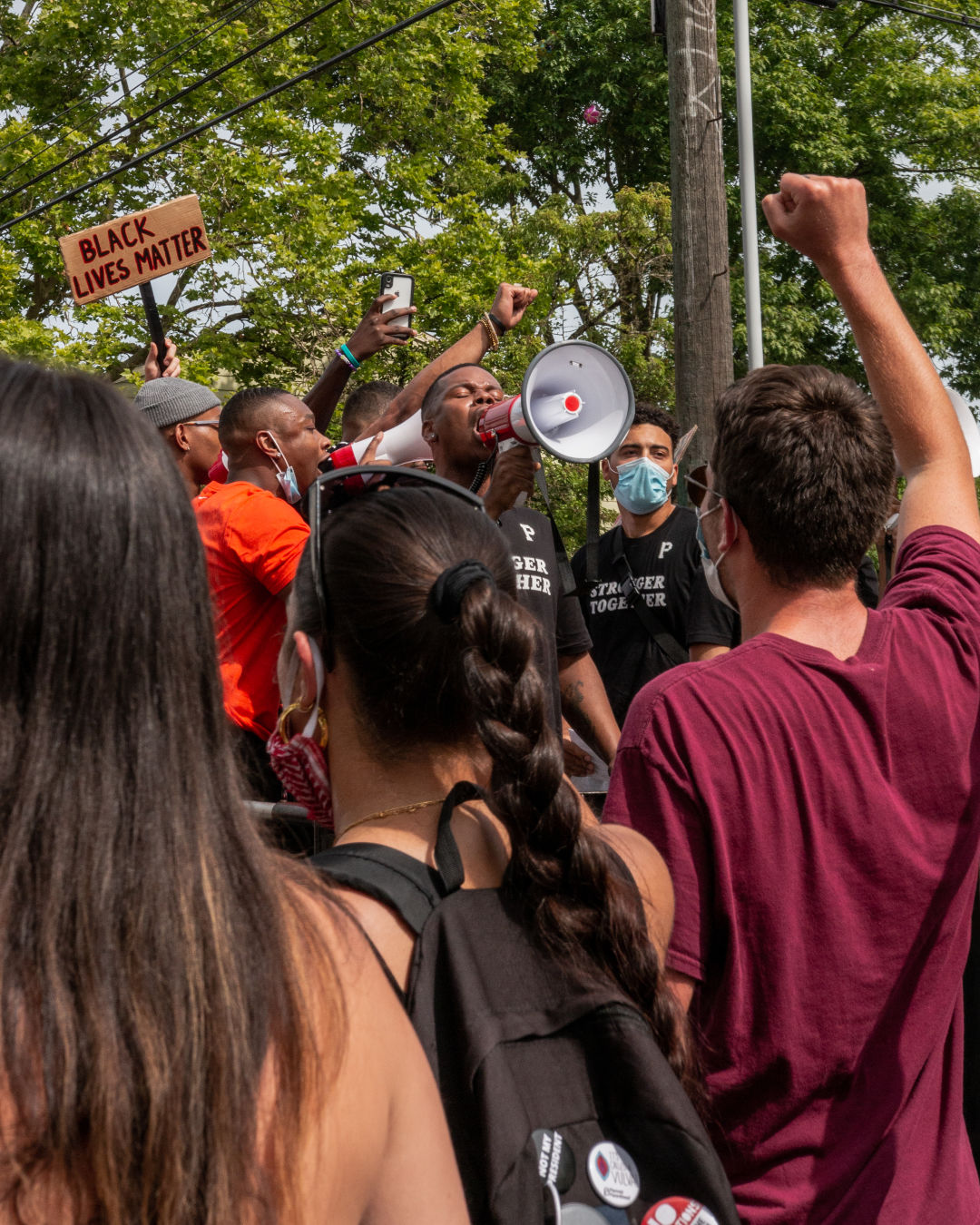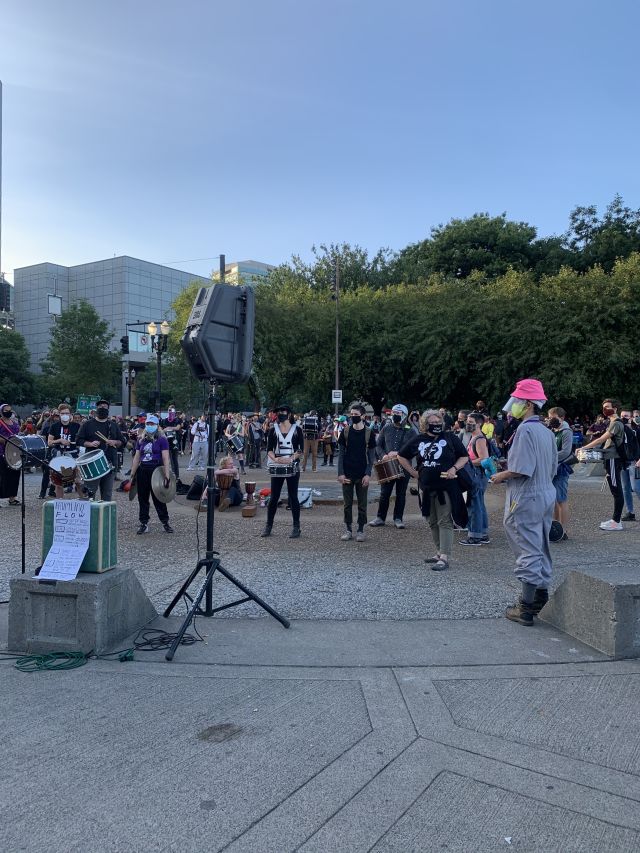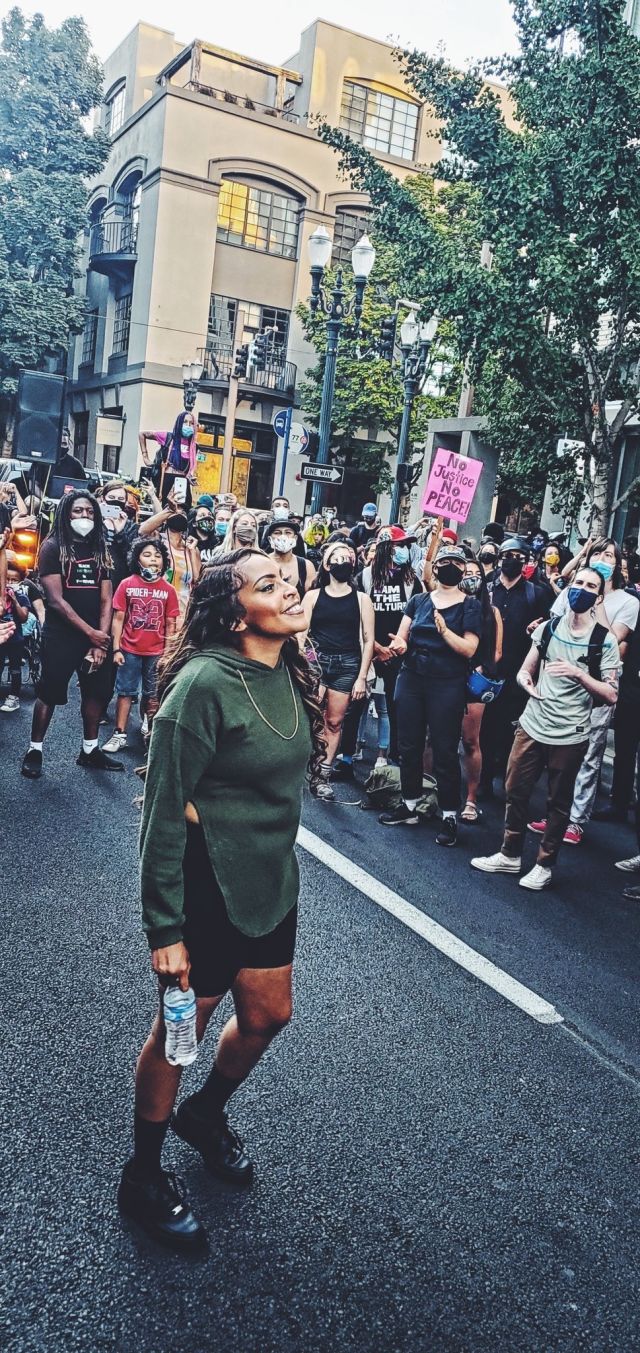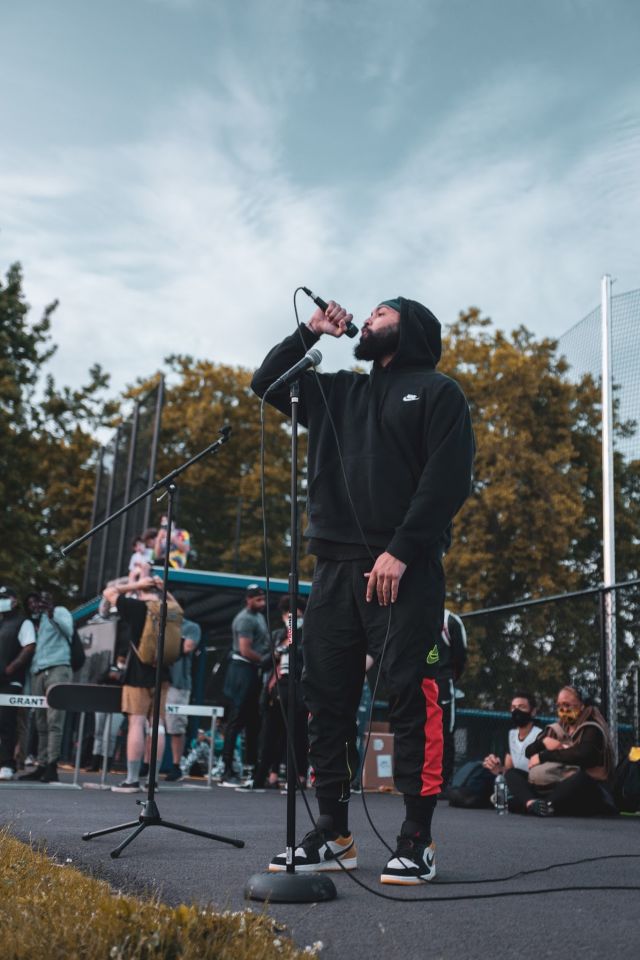Rose City FM: The Sound of the Protests in Portland

From chants to drum lines to new, original music, the sounds emanating from the protests in Portland showcase an energized movement committed to change.
Image: Gabriel Granillo
A tear gas canister explodes off camera, and Portland police emerge from a fog of smoke. They rush a line of shield-carrying protesters and swarm around and apprehend others. It begins faintly, the vibrato of a crooning woman, and it gets louder and louder as the Portland Police Bureau continues to deploy tear gas and push away and arrest protesters. The woman’s voice takes shape and we begin to recognize the song, playing on some unseen speaker system, in a video taken by independent journalist Sergio Olmos that’s been viewed more 88,000 times on Twitter. It’s a stunning rendition of “The Star-Spangled Banner,” which breathes new life as we watch the violence unfold.
The source: Portland Sound Bloc, who asked Portland Monthly to refer to him as Rob. He, and others like him with similar setups, has been out protesting against police brutality and systemic racism for three months, helping amplify Black activists with his speaker and microphone setup and providing a soundtrack to the nightly Black Lives Matter protests in Portland. Rob remembers the night he played “The Star-Spangled Banner,” remembers playing “Yakety Sax” (better known as the Benny Hill theme song) earlier as he witnessed police stumble after protesters, remembers later when police approached him to take away his equipment, remembers asking the police, “Are you really going to do this? Are you really going to take the speakers while I’m playing the national anthem?” He also remembers the sudden blast of pepper spray in his face when he refused to let go.
On the phone a few days after that night, Rob is still stunned by his encounter with the police, laughing it off and then growing solemn as he recounts what inspired him to play the national anthem.
“It felt like the right thing to do,” Rob says. “It felt like, ‘How do I express my frustration at this situation?’ And I did by asking [everyone] ‘What is patriotism?’ and making everyone hear this powerful call to freedom, this powerful call about what is bravery, about what does this country stand for, while we’re watching police do things that I think are absolutely counter to what the country says it stands for…. The deepest irony is we’re protesting against police brutality, and the Portland police, the only thing they can think of as a response is more brutality.”
Rob says he began Portland Sound Bloc as a sort of counter to PPB’s long range acoustic device (LRAD), which can be used as a sonic weapon (and was used as such on June 5) to disperse crowds but has primarily served as a communication device issuing orders and warnings at the nightly protests and declaring riots. To combat the LRAD, affectionately called DJ LRAD by many protesters, Rob designed his own rig: a BL Compact One portable PA, and external Bluetooth receiver, a condenser mic, and more than 20 playlists on his phone. Depending on the energy of the night, Rob will play anything from the Rage Against the Machine and N.W.A. to Gloria Gaynor’s “I Will Survive” and Les Misérables’ “Do You Hear the People Sing?” But Rob’s favorite audio to play: a speech by local writer and educator Walidah Imarisha called “Why Aren’t There More Black People in Oregon?”
Rob sees his role as an energy driver, much like the sound techs at the Moda Center during Blazer games, hopefully helping push the movement forward, amplifying voices, and keeping momentum as the protests reach the 100-day mark.
In the same way that Rob views his role, Phillip Wenzel, too, is there to help drive and amplify. As part of Frontline Drumline, a collective of percussionists and rhythm makers that act as “the heart beat of the revolution,” Wenzel, on the few nights he’s been out protesting, supports the movement by hanging in the background.

Frontline Drumline at a gathering near the waterfront.
Image: Courtesy Phillip Wenzel
“As a drummer, in general, I’m used to being in the background. The nature of being in that role in a lot of ways is you’re also the pulse. You’re the drive of what’s going on. You can really change the vibe of the group,” Wenzel says. Ultimately, he says, he’s there to help amplify Black voices by creating rhythms for chants and keeping the energy up.
But hanging in the background doesn’t necessarily protect Wenzel from the tear gas or impact munitions or forceful arrest. On the first night out with Frontline Drumline, Wenzel says he was enveloped in tear gas near the Justice Center shortly after PPB declared the night’s demonstration a riot. The incident “completely debilitated” Wenzel. But the next day, Frontline Drumline issued another call to go out.
Strapped with an old field drum, Wenzel and his wife attended the nightly protests when they could—until August 14, when he says they were both brutalized by PPB officers. Wenzel was arrested and charged with assaulting a public safety officer, interfering with a peace officer, resisting arrest, and disorderly conduct in the second degree. He says his wife suffered serious injuries, including a broken arm, as a result of police violence.
After his arrest, Wenzel was doxed by Andy Ngo, editor-at-large at the Post Millennial. Ngo has been criticized for his coverage of social and political movements, most recently the Black Lives Matter demonstrations in Portland. Wenzel is one of many protesters whose mugshots and personal information have been shared by Ngo on his Twitter account, which has more than 680,000 followers. Ngo’s tweet with Wenzel’s mugshot and work information was then shared by Department of Homeland Security Acting Deputy Secretary Ken Cuccinelli.
Both the arrest and the doxing incident have left Wenzel traumatized, receiving counseling with a licensed clinical counselor, whom he continues to see. He says he’s been too distraught to bring himself to another protest, but Frontline Drumline continues to hold events, with another planned on Labor Day. Wenzel says he’s shaken by his experience, but inspired by the folks who continue to go out.
“People are putting themselves out there to protest against racial injustices, but also we have to worry about not being attacked,” says Karma Rivera. “But that’s just how Black people live. We always have to do this. That’s what we’re protesting against, just trying to live a life without harassment. It’s really nothing new.”

Karma Rivera
Image: Courtesy Mac Smiff
A Chicago-born, Portland-based hip-hop artist, Rivera says organizers for various BLM events in Portland, some of which she’s performed at, have also been doxed by Ngo, leading to an incident where a man with a gun stood outside one organizer’s house.
Rivera performed at an event near Portland Mayor Ted Wheeler’s Pearl District condo (which he is reportedly moving out of as it has been the site of various nightly demonstrations) on August 28. She was asked to perform earlier that week but says she felt worried, concerned that people wouldn’t respond to her music, which Rivera admits is not political in the way that C3 the Guru, Mic Crenshaw, or Rasheed Jamal’s music is. But as she began her performance, she says the energy changed. She saw children in the audience begin to dance. She saw people on their apartment balconies bobbing their heads and waving Black Lives Matter flags. She saw joy.
“That’s what music does. It brings community together and it becomes a celebration, and that’s exactly what it became. We were celebrating ourselves,” Rivera says.
Both the coronavirus and her ongoing participation in the BLM demonstrations in Portland have shaped Rivera’s approach to songwriting, and on August 7 she released her new single, “Fallout,” a personal reflection about how she’s adapting to this moment and trying to become a better person. Though still not overly political or social, “Fallout” is personal and vulnerable, and celebrates growth. Rivera says it’s not exactly what one might think about in the context of “political music,” but it’s just as important and “provides a different kind of energy.”
“You can’t be serious all the time. That’s so mentally draining, where shit is already fucked up. If the joy is not there, then what the fuck,” Rivera says. “When you’re happy, that amplifies the message even more, keeps people energized, keeps people engaged. We’re pushing a whole different kind of narrative.”
Much in the same way Rivera’s songwriting is being shaped, the protests and the death of George Floyd have affected Jordan Fletcher as well. In June, Fletcher released a freestyle, “8:46,” which was later turned into a music video, in response to Floyd’s murder.
“My headspace in that moment was I got tired of hearing about another Black man dying from the hands of police brutality. My entire life I’ve been hearing this,” Fletcher says. “Why is this always able to happen and there’s no one that gets held accountable for it? Then we’re stuck being called crazy because we’re watching our people get murdered by the police.”
Fletcher was born in Portland. He grew up in the Alberta District and says it’s rare that he meets someone born and raised in the city. His new album, Somewhere Off Alberta, released on August 28, is in some ways a recalling of the past, of his childhood spent between two parents and moments that shaped him as a young man.

Jordan Fletcher
Image: Courtesy Jordan Fletcher
In other ways, it’s about the present, the ongoing struggle for racial justice and equality, a fight that shapes him now. Songs like “Different” and “Paranoid” speak directly to what Fletcher’s been seeing all of his life, but perhaps more apparently at the protests in Portland.
Writing about what’s going on in Portland gives pause for Fletcher to flush out his feelings. But he also sees it as a mobilizing force to give back to this movement, to energize and remind listeners that this moment is not going unheard or unseen.
“I want you to know that this is what’s actually going on. I feel like it’s not talked about, what’s going on. It’s just kind of assumed. From being there, I just want to try to give everyone a visual of like what I’m seeing and feeling when I go out there,” Fletcher says. “I want people to listen to [my music] when they are on their way to a protest or on their way to the North Precinct. For me, I love music that I can relate to. Music is a big part of how I decompress. I want people to feel like somebody out there is talking about this and it’s not just all on deaf ears.”
In this extended episode of Footnotes, Gabriel Granillo discusses how the sounds, chants, and music emanating from the protests in Portland, which have been happening for more than 100 straight days, are energizing the movement.




